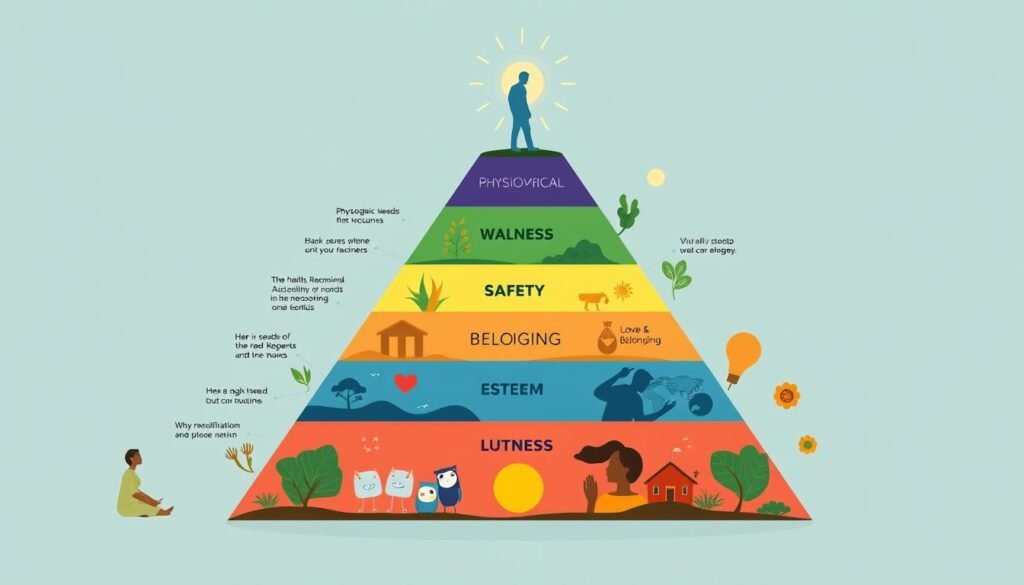Discover Effective Self-Care Routines for Wellness
In today’s fast-paced world, self-care has become an essential component of maintaining overall well-being. Far beyond just physical health, self-care encompasses a holistic approach to nurturing your mind, body, and spirit. By incorporating intentional self-care practices into your daily life, you can unlock a newfound sense of balance, resilience, and fulfillment.
Self-care is not just a luxury; it’s a necessity. Research has consistently shown that engaging in self-care routines can significantly improve your physical and mental health. From reducing stress and anxiety to boosting energy levels and fostering emotional well-being, self-care has the power to transform your personal and professional life.
In this comprehensive guide, you’ll discover a wide array of effective self-care routines that can be tailored to your unique needs and preferences. Whether you’re seeking to cultivate mindfulness practices, manage stress, or prioritize your overall wellness, you’ll find a wealth of strategies and insights to help you embark on a transformative self-care journey.
The Essence of Self-Care
The concept of self-care is multifaceted, with various definitions and interpretations. Often, it is mistakenly reduced to merely taking care of your physical well-being through diet and exercise. However, self-care encompasses so much more – it involves nurturing your mental, emotional, and spiritual health as well.
Understanding the Multifaceted Nature of Self-Care
True self-care is about engaging in activities that support your overall holistic wellness. This includes practices that provide you with a sense of fulfillment, joy, and optimal functioning – even if they don’t bring immediate gratification. The common thread is that these activities should leave you feeling satisfied and aligned with your authentic self.
Self-Care: More Than Physical Well-Being
While physical self-care, such as maintaining a healthy mind-body connection through proper nutrition, exercise, and rest, is essential, it’s only one piece of the puzzle. Emotional health and mental health routines are equally crucial for holistic well-being. Activities that nurture your inner world, provide a sense of purpose, and help you manage stress and emotions are all integral parts of a comprehensive self-care practice.
Ultimately, self-care is about honoring your unique needs and preferences to achieve a state of balanced wellness. By adopting a multifaceted approach, you can unlock the true essence of self-care and experience its transformative benefits.
Maslow’s Hierarchy and the Foundations of Self-Care
To truly understand the essence of self-care, we must first explore the seminal work of psychologist Abraham Maslow and his renowned “Hierarchy of Needs” theory. This five-tier model identifies the fundamental human needs that drive our behavior and well-being, ranging from the most basic physiological requirements to the highest levels of self-actualization.
At the foundation of Maslow’s hierarchy are the physiological needs – the essential elements like air, food, water, shelter, and sleep that are critical for our survival. Once these basic needs are met, individuals can then focus on addressing their safety needs, which encompass the desire for order, predictability, and control in their lives.
As individuals progress up the hierarchy, they begin to seek fulfillment of their love and belonging needs, craving interpersonal relationships, affiliation, and a sense of connection with others. The subsequent tier, esteem needs, involves the pursuit of self-worth, accomplishment, and the respect of both oneself and others.
At the pinnacle of Maslow’s hierarchy lies the need for self-actualization – the realization of an individual’s full potential, personal growth, and the pursuit of peak experiences. While few may ultimately reach this lofty level, understanding the foundation of basic needs is crucial for everyone seeking to cultivate comprehensive self-care routines.
By aligning your self-care practices with Maslow’s hierarchy, you can ensure that you are addressing your fundamental physical and emotional needs, laying the groundwork for higher levels of wellness, fulfillment, and self-actualization. This holistic approach to self-care is the key to unlocking your true potential and achieving a balanced, thriving lifestyle.

As Sutter Health, a network of over 15,000 nurses, has demonstrated during the COVID-19 pandemic, the principles of Maslow’s hierarchy can be effectively applied to support the well-being of healthcare professionals and other essential workers. By prioritizing the fulfillment of basic needs, fostering a sense of safety and belonging, and providing avenues for personal growth, organizations can cultivate a culture of self-care that empowers individuals to thrive, even in the face of extraordinary challenges.
The Mind-Body Connection: Physical Self-Care
The connection between your physical well-being and your mental and emotional health is undeniable. That’s why physical self-care is so crucial for your overall wellness. By focusing on fueling your body through a healthy diet and nutrition, engaging in regular exercise routines, and prioritizing sleep habits, you can unlock numerous benefits that positively impact your body-mind connection and overall preventative health.
Fueling Your Body: Diet, Exercise, and Rest
Maintaining a balanced and nutritious diet provides your body with the essential nutrients it needs to function optimally. Incorporating a variety of fruits, vegetables, lean proteins, and whole grains into your meals can boost your energy levels, support your immune system, and promote healthy sleep habits.
Complementing your healthy diet with regular exercise is a powerful combination for physical self-care. Activities such as daily walking, yoga, or moderate workouts release endorphins, improve cardiovascular health, and contribute to better body-mind connection and overall preventative health.
Finally, prioritizing adequate rest and sleep is crucial for allowing your body to recharge and heal. Aiming for 7-9 hours of quality sleep each night can positively impact your physical self-care and support your mental well-being.
| Physical Self-Care Practices | Benefits |
|---|---|
| Balanced Diet | Improved Energy, Immune Function, Sleep Quality |
| Regular Exercise | Enhanced Cardiovascular Health, Endorphin Release, Better Body-Mind Connection |
| Adequate Rest and Sleep | Improved Physical and Mental Well-Being, Preventative Health |
Nurturing Your Mental Well-Being
Maintaining good mental health is a crucial aspect of self-care. Engaging in cognitive activities that challenge your mind, such as learning new skills, solving puzzles, and reading, can help keep your brain sharp and stimulated. By embracing self-compassion and self-acceptance, you can cultivate a healthier, more mindful approach to your thoughts and emotions.
Focusing your attention on things that bring you joy and avoiding negative self-talk are also important mental self-care strategies. According to the Centers for Disease Control (CDC), only 33% of Americans get the sleep they need, which can significantly impact mental well-being. The National Sleep Foundation recommends that average adults need approximately 7-9 hours of sleep per night to function optimally.
Incorporating emotional regulation techniques, such as mindfulness practices, can lead to a 50% improvement in mental well-being. By acknowledging and celebrating your achievements, no matter how small, you can experience a 30% increase in self-esteem and self-worth, further supporting your overall mental self-care.
Remember, nurturing your mental well-being is an ongoing journey. By prioritizing cognitive activities, practicing self-compassion, and engaging in mindfulness practices, you can cultivate a healthy, resilient, and fulfilling mental state.
| Mental Self-Care Strategies | Potential Benefits |
|---|---|
| Engaging in cognitive activities | Keeps the brain sharp and stimulated |
| Practicing self-compassion and self-acceptance | Cultivates a healthier, more mindful approach to thoughts and emotions |
| Prioritizing quality sleep | Boosts productivity and overall mental well-being |
| Incorporating emotional regulation techniques | Improves mental well-being by 50% |
| Acknowledging and celebrating achievements | Increases self-esteem and self-worth by 30% |
The Power of Social Connections
Nurturing your social self-care and spending quality time with loved ones is a vital aspect of overall well-being. When we feel low, it can be tempting to isolate ourselves, but what we really need is companionship and a sense of community engagement. Scheduling regular get-togethers with friends and family, and participating in activities that allow you to build healthy relationships, can have a profound positive impact on your social support and overall well-being.
Building Sustainable Relationships
Research has consistently demonstrated the significance of social connections in maintaining physical and mental health. Studies show that high social support and social integration are associated with the lowest relative odds of mortality compared to many other well-accepted risk factors. In fact, social connections have been shown to improve the odds of survival by 50%. Conversely, low social interaction has been compared to the harm of smoking 15 cigarettes a day, being an alcoholic, not exercising, and being twice as harmful as obesity.
Maslow’s “Hierarchy of Needs” and the self-determination theory both emphasize the importance of social connection and relatedness as fundamental human needs for psychological growth and development. Oxytocin, the “bonding hormone,” is produced in response to social stimuli and is associated with positive emotions, mood regulation, and pleasure.
To build and maintain sustainable relationships, consider the following strategies:
- Devote focused time for regular contact with others
- Find new and diverse social networks to assist in navigating life’s challenges
- Join groups that share your values, interests, and goals to deepen your sense of community
- Volunteer or get involved in the local community to strengthen social ties
- Spend time in nature with others to relax and connect
- Get to know your neighbors to widen your social connections
- Provide support to others to foster closer bonds
- Prioritize your physical health and activity to aid in building connections
- Use technology effectively to minimize distractions and negative influences on social connections

By nurturing your social self-care and building healthy relationships, you can harness the power of social connections to support your overall well-being and thrive in your personal and professional life.
Embracing Spiritual Growth
Nurturing your spiritual well-being can be an essential component of self-care. Whether it involves religious practices, mindfulness and meditation, time in nature, or exploring existential questions about life and your place in the universe, engaging in activities that foster a deeper sense of meaning and purpose, as well as a connection to something greater, can contribute significantly to your overall well-being and balance.
Unfortunately, recent studies suggest that only 29% of individuals tend to read through the Bible every three months, demonstrating a decline in sustained engagement with religious texts. Furthermore, a concerning 45% of individuals experience burnout attempting to engage in numerous spiritual practices, highlighting the potential negative impact of overcommitting to faith activities.
To address these challenges, it’s essential to approach your spiritual self-care with intention and balance. Set aside dedicated time and space for reflection, meditation, and exploration of your inner world. Experiment with different practices, such as breathwork, journaling, or connecting with nature, to find what resonates most with you.
| Spiritual Self-Care Practices | Benefits |
|---|---|
| Mindfulness Meditation | Reduces stress and anxiety, enhances focus and clarity |
| Gratitude Journaling | Fosters a sense of appreciation and positivity |
| Nature Walks | Promotes a sense of connection and grounding |
| Breath Work | Calms the mind, boosts energy, and facilitates relaxation |
Remember, your spiritual self-care journey is unique to you. Embrace the mystery and uncertainty inherent in this exploration, and be patient with yourself as you navigate the ebbs and flows of your spiritual growth.
Emotional Self-Care Routines
Emotional self-care is a vital aspect of overall well-being, involving the development of healthy strategies to process and express difficult emotions. Whether it’s anger, shame, anxiety, or grief, having the tools to manage these feelings can make a significant difference in your mental and physical health.
Developing Healthy Coping Mechanisms
One effective approach to emotional self-care is to build a support system. This could include confiding in a trusted friend or family member, or seeking the guidance of a therapist or counselor. Expressing your thoughts and feelings in a safe, non-judgmental environment can be tremendously therapeutic.
Additionally, learning to set healthy boundaries is crucial for emotional self-care. Prioritizing activities that make you feel energized and focused on your emotional needs can help you maintain a sense of balance and control in your life.
- Engage in emotion regulation techniques, such as journaling, meditation, or positive affirmations, to process and manage difficult emotions.
- Seek therapy and counseling services to work through deeper emotional challenges and develop effective stress management strategies.
- Cultivate a support network of friends, family, or online communities to share your experiences and receive emotional self-care.
By prioritizing your emotional needs and implementing healthy coping mechanisms, you can enhance your overall well-being and resilience in the face of life’s challenges.
Self-Care Routines for Daily Life
Incorporating self-care routines into your daily life can have a profound impact on your physical, mental, and emotional well-being. Simple morning routines and bedtime rituals, such as reading inspirational content, journaling, gentle exercise, or enjoying a soothing beverage, can help set the tone for the day and promote better sleep. Consistently engaging in these small daily self-care practices can reduce stress, increase energy, and foster a greater sense of self-love and balance.
Research shows that self-care encompasses more than just physical health practices. It involves a balance of mind, body, and spirit, both personally and professionally. Finding enjoyable activities for self-care is recommended, as these practices should provide some form of satisfaction or enjoyment. While not all self-care activities may be enjoyable in the moment, they contribute to overall well-being.
To create an effective self-care routine, consider incorporating a mix of activities that bring you joy and provide long-term benefits for your well-being. This could include:
- Spending time outdoors
- Practicing positive thinking
- Engaging in gentle exercise
- Prioritizing quality sleep
- Nurturing social connections
By making self-care a consistent part of your lifestyle and daily habits, you can reduce stress, increase energy, and promote overall well-being. Remember, self-care is a journey, and finding the right balance and routine that works for you is essential.
| Top 10 Self-Care Practices for Daily Routines |
|---|
| 1. Spending time outside |
| 2. Taking naps |
| 3. Turning off phones |
| 4. Practicing positive thinking |
| 5. Spending time with friends |
| 6. Journaling |
| 7. Engaging in gentle exercise |
| 8. Enjoying a soothing beverage |
| 9. Reading inspirational content |
| 10. Prioritizing quality sleep |
Incorporating self-care routines into Your Lifestyle
Developing sustainable self-care strategies requires a thoughtful and gradual approach. Begin by identifying activities that genuinely bring you joy and fulfillment, and intentionally incorporate them into your daily life. Set realistic goals, seek support from your loved ones, and be willing to adapt your routines as needed. Embracing self-care as a lifestyle, rather than a one-time indulgence, can have lasting positive effects on your physical, mental, and emotional well-being.
Habit formation is key when it comes to integrating self-care routines into your lifestyle. According to Dr. Sacco, it can take between 18 to 250 days to develop a habit, with an average of around 66 days. Contrary to the popular belief that it takes 21 days, more recent studies have shown that the timeframe can vary significantly depending on the individual and the complexity of the habit.
To make self-care a sustainable part of your lifestyle, consider setting SMART goals: Specific, Measurable, Achievable, Relevant, and Time-bound. This approach can help you stay focused and motivated as you incorporate a variety of self-care activities, ranging from daily practices to weekly, monthly, and yearly routines. Remember, lapses in your self-care routine are normal, and it’s important to approach them with forgiveness and adaptability rather than giving up.







